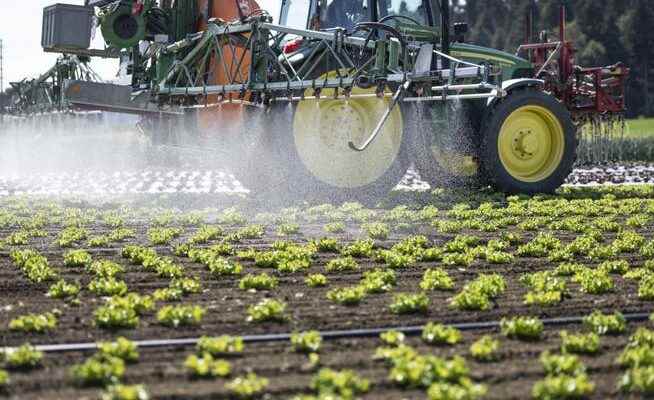Swiss agriculture should make an important contribution to one day feeding the Swiss population of 10 million as healthily and sustainably as possible. However, the small chamber does not want a lowering path for CO2-Emissions in law.
Agriculture causes 15 percent of CO2-Emissions of Switzerland.
After winning various votes, the farmers’ lobby has tailwind in Parliament. The Council of States has accepted two proposals that want to reverse decisions on more biodiversity and less use of pesticides and fertilizers. For example, the 20 percent reduction target for nitrogen is to be weakened. The National Council will deal with the two motions this week.
The agricultural policy 22+, which was suspended two years ago and discussed by the Council of States on Tuesday, also aims in the same direction. Parliament put the AP22+ on hold and asked the Federal Council to take a long-term perspective with a broad interpretation that also includes issues such as food security and food waste. The AP22+ promised that agriculture would produce less, be more environmentally friendly, meet more requirements and that ultimately the farmers’ income would increase without it costing the state more, said Ruedi Noser (Zurich, FDP). Now it needs a different tonality. “What is needed is an intensive and sustainable agricultural policy.” The Ukraine war has increased the focus on the degree of supply.
In the minority are those who warn that agriculture, with its use of pesticides and fertilizers, damages the environment and destroys biodiversity. They see this as a long-term threat to biodiversity.
«Existentially affected by climate change»
The Council of States on Tuesday showed that they are willing to protect agriculture in the discussion about climate targets for agriculture. This causes 15 percent of the CO2-emissions. The climate-damaging methane that is released when cattle are kept and when spreading liquid manure and manure is of great importance. In the council, a left-green minority wanted to make agriculture responsible. She wanted to write a reduction path for greenhouse gases into the law. For industry, transport and buildings there are precise rules for reducing CO2emissions, said Roberto Zanetti (Solothurn, SP). Only for agriculture is there no statutory regulation on how to deal with greenhouse gases.
The reduction path proposed by the minority sees a reduction in CO by 20302emissions of 20 percent. This first stage should be achievable since agriculture has already reduced its emissions by 15 percent compared to 1990. The target for 2040 is 30 percent and for 2050 40 percent. The industry and producer organizations should be involved. Adèle Thorens (Vaud, Greens) emphasized that the entire food system should be included. The scope of action of the individual farmers is relatively small.
For the majority, this specification was too fixed and detailed. The Federal Council has formulated the same ambitious goals in a postulate report, said commission spokesman Peter Hegglin (Zug, center). How this can be achieved must now be examined in depth. “Agriculture itself is existentially affected by climate change, and it takes this issue very seriously,” said Hegglin. The milk industry organization, of which he is president, has been dealing intensively with this matter for two years.
Agriculture Minister Guy Parmelin said the reduction targets proposed by the minority were in line with the Federal Council’s climate targets. For example, these are in the message for the AP22+. Nevertheless, he spoke out against the motion of the minority. The Federal Council’s climate targets for agriculture are binding, even if they are not explicitly anchored in the law, said Parmelin. The farmers’ association resolutely resisted climate targets in the law.
Zanetti compared his proposal to occupational pensions: you should start saving as early as possible so that you can make steady progress. In contrast, the Federal Council and the majority are of the opinion: Let’s see how it turns out. Zanetti: “In 2048 they will probably say: Well, now we have to scale it down massively.” The variant of the Federal Council is like a cliff. The Council of States rejected the minority’s motion by a vote of 30 to 10.
No money for advice on biodiversity
In addition, the Council of States cut contributions to consulting costs in favor of biodiversity. The majority argued that consulting firms in particular would benefit from this. Green representative Thorens regretted that various biodiversity measures had been removed from the Federal Council’s original proposal.
A revision of the land law was also planned in the first edition of the AP22+. The Council of States removed them from the bill and instructed the Federal Council to reopen the issue. In addition, the Federal Council should specify its proposals for the future of agricultural policy after 2030 and present them in a dispatch by the end of 2027.
The proposal goes to the National Council.
